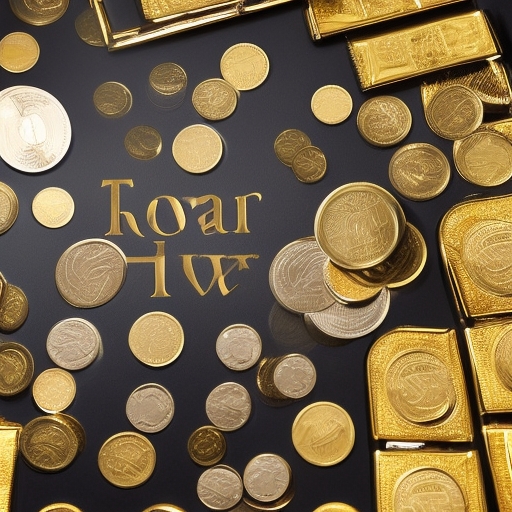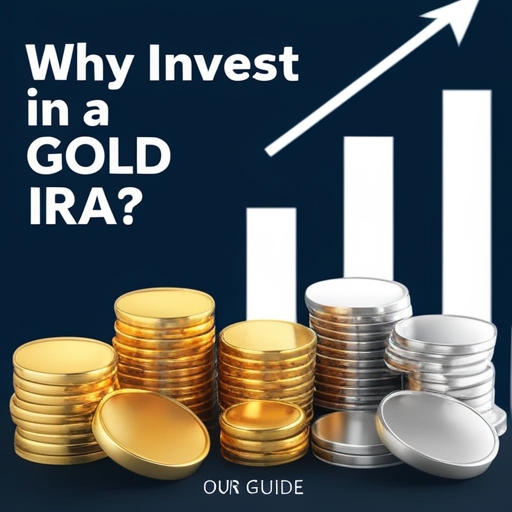If you're looking to understand what a Gold IRA is, you're in the right spot. This guide will walk you through everything you need to know about Gold IRAs, from benefits to tax implications. Let's dive right in.
| Key Points | Description |
|---|---|
| Definition | A Gold IRA is a self-directed IRA that allows investment in physical gold and other precious metals. |
| Benefits | Portfolio diversification, hedge against inflation, long-term wealth preservation. |
| Tax Advantages | Tax-deferred growth, potential tax deductions on contributions. |
| Risks | Gold price volatility, storage costs, complex IRS regulations. |
What is a Gold IRA?
A Gold IRA is a type of self-directed IRA that allows you to invest in physical gold and other precious metals. Unlike traditional IRAs, which typically hold stocks and bonds, a Gold IRA holds IRS-approved gold in the form of gold bullion, coins, or bars.
This type of IRA offers a unique way to diversify your retirement portfolio by including a tangible asset. Gold IRAs are often seen as a safe-haven asset due to their ability to hedge against inflation and economic downturns.

Benefits of Investing in Precious Metals
Investing in precious metals like gold offers several benefits. One of the primary advantages is portfolio diversification. By adding gold to your retirement portfolio, you reduce the risk associated with traditional investments like stocks and bonds.
Gold is known for its stability and ability to retain value over time, making it an excellent hedge against inflation. Another benefit is the potential for long-term wealth preservation. Gold has been a store of value for centuries, and its demand continues to rise.
How to Get Started with a Gold IRA
To get started with a Gold IRA, you'll first need to choose a reputable IRA custodian. The custodian will help you set up your account and guide you through the process of purchasing gold. It's essential to select a custodian with experience in handling precious metals IRAs to ensure compliance with IRS regulations.
Once you've chosen a custodian, you'll need to fund your Gold IRA. This can be done through an IRA rollover or a 401(k) rollover. After funding your account, you can start purchasing IRS-approved gold.
Tax Implications of a Gold IRA
A Gold IRA offers several IRA tax advantages. Contributions to a traditional Gold IRA are typically tax-deductible, reducing your taxable income for the year. Additionally, the growth of your investment is tax-deferred, meaning you won't pay taxes on gains until you withdraw funds during retirement.
However, it's important to be aware of the IRA contribution limits set by the IRS. Exceeding these limits can result in penalties. When you withdraw funds from your Gold IRA, they will be taxed as ordinary income.
Risks and Challenges
While Gold IRAs offer numerous benefits, they also come with risks and challenges. One of the primary risks is the gold spot price volatility. Gold prices can fluctuate significantly, impacting the value of your investment.
Another challenge is the cost of physical gold storage. Storing gold in a precious metals depository can incur additional fees. It's crucial to factor in these costs when evaluating the overall return on your investment.
Choosing the Right Custodian
Selecting the right custodian is a critical step in setting up a Gold IRA. A reliable custodian will provide custodial services and ensure compliance with IRS rules. Look for a custodian with a strong reputation and experience in handling precious metals IRAs.
Consider the fees associated with the custodian's services. These fees can vary, so it's essential to compare different custodians to find one that fits your budget. Additionally, ensure that the custodian offers secure physical gold storage options to protect your investment.
Comparing Gold IRAs to Traditional IRAs
Gold IRAs and traditional IRAs have distinct differences. While traditional IRAs typically hold stocks, bonds, and mutual funds, Gold IRAs focus on precious metals. This difference in asset allocation provides unique benefits and risks.
Gold IRAs offer a hedge against inflation and economic uncertainty, making them an attractive option for risk-averse investors. However, traditional IRAs may offer higher growth potential due to their exposure to the stock market.
Storage Options for Gold Investments
When investing in a Gold IRA, you'll need to decide on storage options for your physical gold. Most investors choose to store their gold in a precious metals depository. These facilities offer secure storage and insurance coverage to protect your assets.
Alternatively, some investors opt for home storage, although this comes with additional risks and responsibilities. It's crucial to weigh the pros and cons of each storage option and choose one that aligns with your investment strategy.
How to Diversify with Gold
Diversifying with gold involves incorporating different forms of gold into your investment portfolio. This can include gold bullion, coins, and bars. Each form of gold offers unique benefits and can help you achieve a balanced portfolio.
Consider diversifying with other precious metals like silver, platinum, and palladium. These metals can complement your gold investments and provide additional protection against market volatility.
Costs Involved in a Gold IRA
Investing in a Gold IRA involves several costs. These can include custodian fees, storage fees, and transaction fees. It's essential to understand these costs and factor them into your investment strategy.
- Custodian Fees: Charges for account management and administration
- Storage Fees: Costs associated with storing physical gold in a depository
- Transaction Fees: Fees for buying and selling gold within the IRA
Understanding these costs can help you make informed decisions and maximize your investment returns.
Long-term Wealth Preservation Strategies
Gold IRAs are an excellent tool for long-term wealth preservation. By investing in gold-backed IRAs, you can protect your assets from inflation and economic downturns. Gold's historical stability makes it a reliable option for preserving wealth over time.
Consider incorporating other alternative investments like gold mining stocks and Gold ETFs into your strategy. These investments can provide additional growth opportunities while maintaining a focus on asset preservation.
Understanding IRS Regulations
The IRS has specific regulations governing Gold IRAs. It's crucial to understand these rules to ensure compliance and avoid penalties. Some key regulations include:
- Only certain types of gold are eligible for inclusion in a Gold IRA
- Gold must be stored in an approved depository
- There are annual contribution limits for IRAs
- Required Minimum Distributions (RMDs) apply to traditional Gold IRAs
Working with a knowledgeable custodian can help you navigate these complex regulations.
The Role of Gold in Economic Uncertainty
Gold has long been considered a safe-haven asset during times of economic uncertainty. Its value tends to rise when other investments falter, making it an attractive option for investors seeking stability.
During periods of high inflation or currency devaluation, gold often retains its purchasing power. This makes it a valuable tool for protecting wealth against economic downturns and market volatility.
Evaluating Gold Purity and Quality
When investing in a Gold IRA, it's essential to understand gold purity and quality. Gold is typically measured in karats, with 24 karat being pure gold. The IRS has specific requirements for the purity of gold eligible for inclusion in a Gold IRA.
Most Gold IRAs include gold with a purity of at least 99.5%. This ensures that your investment meets IRS standards and maintains its value over time. Working with a reputable dealer can help you select high-quality gold for your IRA.
The Process of Liquidating a Gold IRA
When it's time to take distributions from your Gold IRA, you'll need to understand the liquidation process. This involves selling your physical gold and converting it to cash. Your custodian will typically handle this process, ensuring compliance with IRS regulations.
It's important to plan your distributions carefully to minimize tax implications. Consider consulting with a financial advisor to develop a distribution strategy that aligns with your retirement goals.

Global Economic Factors Affecting Gold Prices
Several global economic factors can impact gold prices, which in turn affect the value of your Gold IRA. These factors include:
– Geopolitical tensions
– Currency fluctuations
– Central bank policies
– Global economic growth rates
Understanding these factors can help you make informed decisions about your Gold IRA investments and anticipate potential market shifts.
Balancing Your Retirement Portfolio with Gold
While Gold IRAs offer many benefits, it's important to maintain a balanced retirement portfolio. Financial experts often recommend allocating 5-10% of your portfolio to precious metals, including gold.
By balancing your Gold IRA with other investments, you can create a diversified portfolio that provides both stability and growth potential. This balanced approach can help you achieve your long-term financial goals while managing risk.
Conclusion
In conclusion, a Gold IRA offers a unique opportunity to diversify your retirement portfolio with precious metals. By understanding the benefits, risks, and costs associated with Gold IRAs, you can make informed investment decisions.
Whether you're looking to hedge against inflation or preserve wealth for the long term, a Gold IRA can be a valuable addition to your investment strategy. Remember to choose a reputable custodian and consider your storage options carefully. With the right approach, a Gold IRA can help you achieve your financial goals and secure a prosperous retirement.
Can I hold other precious metals in my Gold IRA?
Yes, you can hold other IRS-approved precious metals like silver, platinum, and palladium in addition to gold in your Gold IRA.
How often should I review my Gold IRA investments?
It's recommended to review your Gold IRA investments at least annually to ensure they align with your overall retirement strategy and market conditions.
Are there any age restrictions for opening a Gold IRA?
There are no age restrictions for opening a Gold IRA, but there are rules regarding contributions and distributions based on your age.

